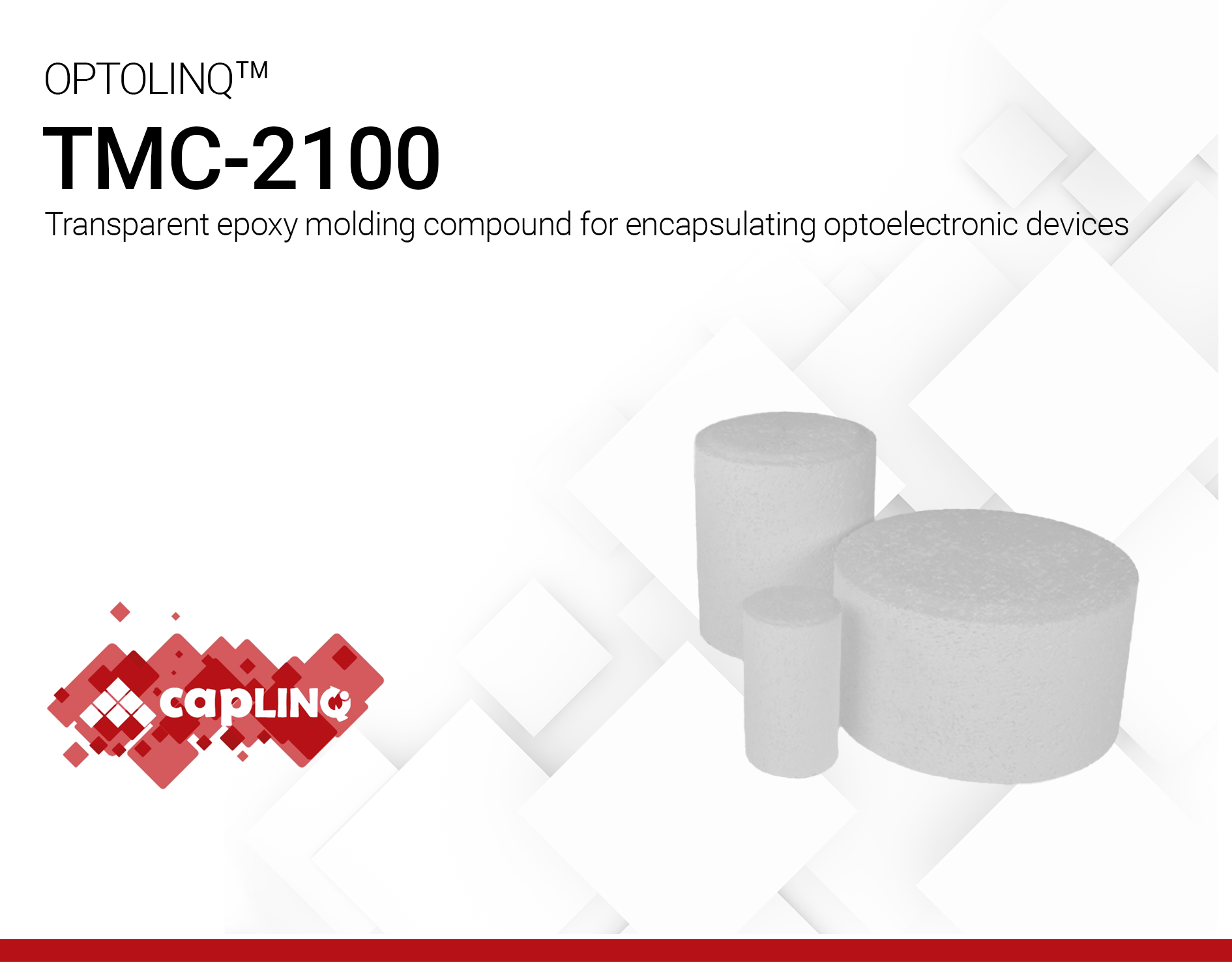OPTOLINQ TMC-2100 | Transparent Mold Compound
- Exceptional moldability with long spiral flow
- Low moisture absorption
- Excellent reliability
Product Description
OPTOLINQ TMC-2100 is an optically clear epoxy molding compound specifically designed for the encapsulation of optoelectronic devices. With its high spiral flow, it ensures precise and intricate molding.
OPTOLINQ TMC-2100 offers excellent moisture resistance, maintaining performance even in high temperature and humidity conditions. TMC-2100 stands out with its superior moldability and reliability, ensuring good quality and precision in optoelectronic device molding.
OPTOLINQTM TMC-2100IR is an optically clear epoxy molding compound specifically designed for the encapsulation of applications that require infrared transparency. With its large spiral flow, it ensures precise and intricate molding. TMC-2100IR exhibits a low moisture absorption and high moisture resistance maintaining performance in high temperature and humidity conditions. Contact us for custom sizes or other specific requirements.
Key Features
- High IR Transparency: Ensures superior infrared light transmission for optimal device performance.
- Low Moisture Absorption & Excellent Moisture Resistance: Effectively prevents moisture ingress, safeguarding long-term reliability.
- Reliable Under Harsh Conditions: Maintains consistent performance in environments with elevated temperature and humidity.
- High Adhesion & Low Stress: Provides strong, durable bonding with minimal internal stress, reducing risk of delamination or cracking.
Typical Applications
- Low-Power LED & Emitters
- Pulse Oximeter Sensors
- Ambient Light Sensors
- IR and Near-IR Sensors
- Data transmission and industrial fibers.
Versions Available
- Standard Low stress optical molding compound - TMC-2100
- Enhanced self-release, visible-pass with NIR filtering (>1100 nm) - TMC-2100H
- Superior IR optical transparency - TMC-2100IR
Alternative to: XX-8524 Series, XX-824H, XX-330H.
Technical Specifications
| General Properties | |
| Color Color The color | Transparent |
| Specific Gravity Specific Gravity Specific gravity (SG) is the ratio of the density of a substance to the density of a reference substance; equivalently, it is the ratio of the mass of a substance to the mass of a reference substance for the same given volume. For liquids, the reference substance is almost always water (1), while for gases, it is air (1.18) at room temperature. Specific gravity is unitless. | 1.25 |
| Thermal Properties | |
| Glass Transition Temperature (Tg) Glass Transition Temperature (Tg) The glass transition temperature for organic adhesives is a temperature region where the polymers change from glassy and brittle to soft and rubbery. Increasing the temperature further continues the softening process as the viscosity drops too. Temperatures between the glass transition temperature and below the decomposition point of the adhesive are the best region for bonding. The glass-transition temperature Tg of a material characterizes the range of temperatures over which this glass transition occurs. | 110-130 °C |
| Curing Conditions | |
| Transfer Pressure | 30-80 kg/cm2 |
| Physical Properties | |
| Spiral Flow @ 175°C | 80-180 cm |
Additional Information
| Property | Value | Unit |
|---|---|---|
| Specific gravity | 1.20–1.25 | – |
| Hardness at 25 °C | 80 | Shore D |
| Gel time at 150 °C | 35–60 | s |
| Spiral flow at 150 °C | 80–180 | cm |
| Mold shrinkage | 1.5 | % |
| Glass transition temperature by TMA | 120±10 | °C |
| Coefficient of thermal expansion, α1 | 60–100 | ppm/K |
| Coefficient of thermal expansion, α2 | 170–210 | ppm/K |
| Flexural strength | 110 | MPa |
| Flexural modulus | 2.6–3.4 | GPa |
| Transmittance at 400 nm | >85 | % |
OPTOLINQ TMC-2100 | Optically Clear Molding Compound
TMC-2100 is developed to exhibit robust optical performance, TMC-2100IR a high IR transparent version designed for applications operating above the visible light spectrum.
OPTOLINQ TMC-2100IR | Optically Clear Molding Compound
TMC-2100IR boasts its blended chemistry system to improve IR transparency through refractive index matching and IR-transparent fillers. The transmittance shown is measured at 2 mm thick sample and will exhibit higher transmittance at a thinner samples and packages.
 Inspected specimens are 1 mm thick sample cured in mold for 4 minutes at 150°C and post cured for 4 hours at 150°C.
Inspected specimens are 1 mm thick sample cured in mold for 4 minutes at 150°C and post cured for 4 hours at 150°C.  Inspected specimens are 2 mm thick sample cured in mold for 4 minutes at 150°C and post cured for 4 hours at 150°C.
Inspected specimens are 2 mm thick sample cured in mold for 4 minutes at 150°C and post cured for 4 hours at 150°C.
Featured BMC-4200H Variants: CAPLINQ Product Offerings

OPTOLINQ BMC for Filter Applications
Looking to enhance optical precision and durability in your filter-integrated optoelectronic devices? This short presentation introduces OPTOLINQ’s clear molding compounds specifically designed for high-performance filter applications.
Featuring BMC-4200H, a versatile formulation available in six onset wavelengths (700, 720, 750, 820, 840, and 870 nm), our clear compounds offer exceptional light control, environmental resistance, and long-term optical clarity.
Whether you're fine-tuning signal filtering, improving IR sensitivity, or ensuring high transmission and structural stability, OPTOLINQ compounds are built to perform—clear, consistent, and reliable.
Got questions or need help selecting the right optical grade for your filter applications? Reach out to us!
Contact Us →
Directions Before Use
- Thaw TMC-2100 to room temperature (20±5℃, 40±15%RH) at least 24 hours before use. Do not open the bag to avoid moisture contamination.
- Slowly preheat the molding compound using standard RF equipment.



